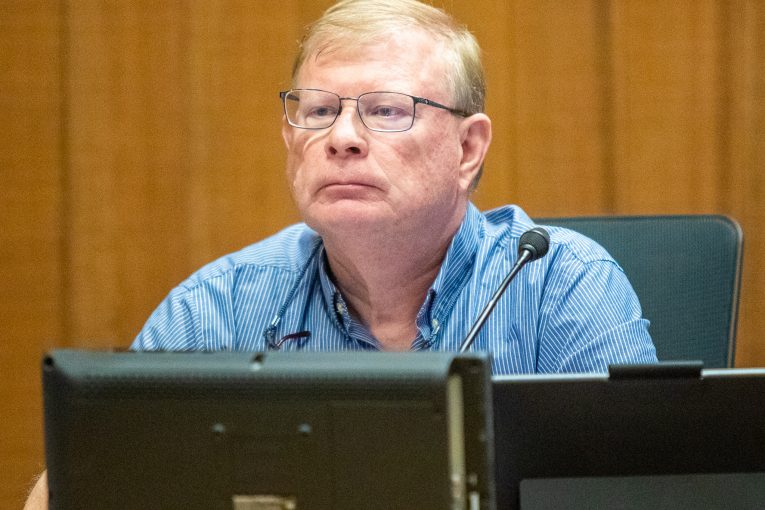

Who knew that the last piece of the complex districting puzzle would be the selection of the mayor.
In his guiding principles last week, Dan Carson proposed, “Prevent future quarrels over mayoral appointments, after Brett Lee and Gloria Partida have completed their terms as mayor, by rotating the position of mayor each year to the council member with the longest tenure on council who has not yet served as mayor.”
But his colleagues didn’t necessarily agree.
“I think it’s important that the mayor represents the general consensus of the council,” Mayor Brett Lee said during his comments.
He added: “One of the concerns I have about the district process, and I’ll just be candid, is a district may elect a person who is generally out of step with the consensus of the council — and there’s nothing wrong with that; it’s important to have contrary views — but in terms of chairing a meeting… I think it’s important for that person to be able to bring people together and that would be a quality that I don’t know is automatically assumed just by the person with the most seniority who hasn’t been mayor.”
I suppose the interesting thing about the mayor’s position is that the current system of allowing the top vote-getter in the previous election become mayor carries with it the same threat.
Lucas Frerichs likes to point out that the current system was a power play by a past council to pass over an unpopular choice for mayor.
He has suggested going to a regular rotation among council members.
When the Vanguard first started in July 2006, one of the big controversies was whether the council majority at that time would allow Sue Greenwald to become mayor. The majority was dead set against Ms. Greenwald (no relation), the highest vote-getter in the 2004 election, but ultimately decided that community outrage would be too high if they tried to pull a fast one. And so for the  most part she was mayor, but the majority could muster three votes against her whenever they wanted.
most part she was mayor, but the majority could muster three votes against her whenever they wanted.
The problem with going to a district voting system is, as Councilmember Carson suggests, it runs the risk of dividing the council into factions. The council has generally avoided factions over the last decade or so – ever since the 2010 election.
But the 2006 situation is instructive. Factions are going to arise at times. When they do it probably does not matter if we have district elections or if we have an automatic system for selecting the mayor.
After all, from 2004 until 2010 there were in fact deep cleavages and factions in the system. It was a very rigid process. This was despite having two tools that should have mitigated against factions – the at-large election of members and the top vote-getter as mayor.
The system of mayor is undoubtedly weak in Davis. A mayor is basically a first among equals, to borrow the description of the Chief Justice of the Supreme Court. They have no added power other than maybe the power to agenda set and run the meeting – but even there, as we saw from 2006 to 2008, the mayor can be overruled by a strong majority faction.
I have expressed the point before – I would probably prefer a stronger weak mayor system. I liked the system in San Luis Obispo, where I grew up and was involved in politics while in college. They set it up like this: four councilmembers elected to four-year terms – two each cycle and every term a mayor was separately elected for two years.
The mayor was still weak – with a two-year rather than four-year term, but it also created an independently elected position and one that was a clear step up for politicians.
In Davis, we really have no mayor – we have a presiding officer. We made it a little prestigious in the past by designating the highest vote receiver as mayor. Now we want to completely eliminate the prestige of the position.
If we are headed to this route, I would not do it by seniority – it gets too complicated. Just do a straight rotation starting with Gloria Partida and then change each year to the next higher district.
I would have liked to have seen a bit more thought put into this before the rest of the system was locked into place. But here we are.
—David M. Greenwald reporting


That has been the case in Davis for decades, and to the best of my knowledge there have been no negative situations that have arisen as a result. Changing the “ceremonial only” status of the mayor in Davis sounds like a solution in search of a problem.
When should Gloria become Mayor? Under the old system it would have been in June. I think she should get to be mayor in June or perhaps we should split the extra time added to the current term by the change to November elections and pass the gavel in August.
Maybe the so-called homeless should choose the mayor.
Kills two birds with one bear pooping in the woods.
Patently untrue, as written.
Got an interesting email from one of the people on the 1990 council who explained how it all worked. You’re correct.